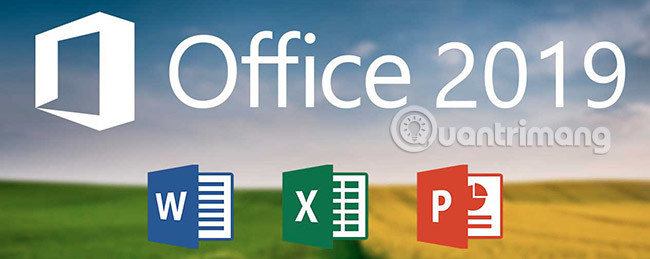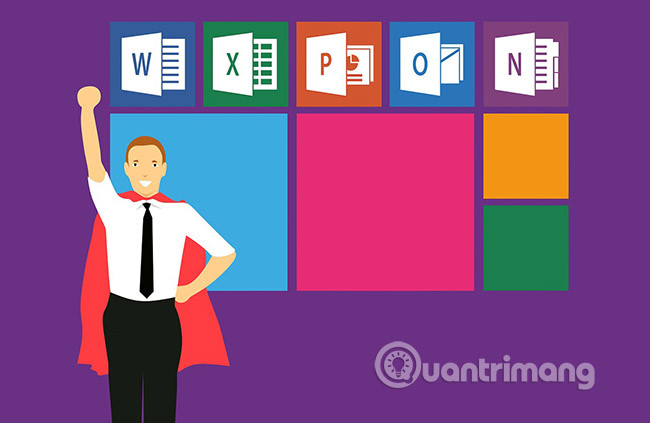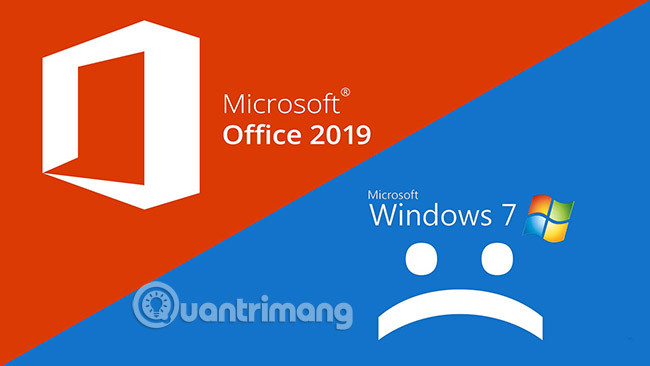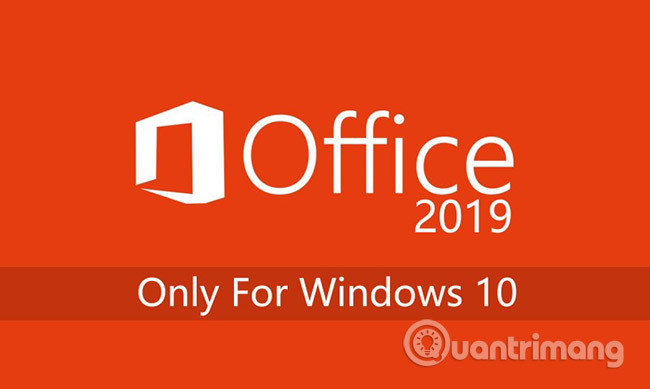Frequently asked questions about Office 2019
Microsoft has provided some details about the next version of Office without registration, next year. The following article is a few answers to questions about this upcoming software suite.
Last year, Microsoft announced that Office 2016 will have a 'successor', another unregistered version of the Office suite and the time it will be released after about a year.
The package is named "Office 2019" and will primarily target businesses - "people who are not ready to use cloud services", according to Microsoft.
In addition to that description, Microsoft also unveiled much of Office 2019's prospects with a "permanent" license - a key that allows customers to run software until they want without paying any extra any money. Therefore, the following article will summarize some urgent questions that businesses wonder about this suite.
Some questions about Office 2019
- What is 'permanent' Office?
- When will Microsoft release Office 2019?
- What will Office 2019 have?
- How will Microsoft sell Office 2019?
- Why is it important for Microsoft to release Office 2019 this year?
- Will Microsoft still release a once-purchased version of Office after Office 2019?
- Is it true that Office 2019 won't work on Windows 7 or even Windows 8.1?
What is 'permanent' Office?
Microsoft classifies software according to the payment method. The firm clearly distinguishes between two types of licenses: A type of license that is bought entirely (one-off payment) and one type of license, essentially "hired" (paid on a period of time) certain space, like registration).
Often, Microsoft uses the term "one-time purchase" to indicate the type of software license that is paid by "an upfront cost to receive Office applications for a computer". This license grants payers the right to use Office permanently. In other words, the license has no expiration date and users can run the software until they want.

When will Microsoft release Office 2019?
The company has confirmed it will launch the software in the second half of this year. "This release, scheduled for the second half of 2018, will include permanent versions of Office and server applications," said Jared Spataro, Office general manager, writing in a post. in September on the company's blog.
- Microsoft will release Office 2019 next year
There is no exact release date for Office 2019, but based on some of the information provided, we can guess more or less.
At the end of September 2015, Microsoft provided the Windows Office 2016 version for customers using Office 365 first, then followed by retail versions. Office 2019 may appear at around the same time in 2018, in the same order as above.
The reason for this is because Microsoft has now released two updates of Office 365 ProPlus - ProPlus features as a standard Office suite, granting permissions to locally installed applications, including Excel, Outlook and Word, for annual Office 365 packages. These feature upgrades are available to customers in September and March each year. (On September 12 last year, Microsoft released a feature upgrade, called 1708, for Office 365 ProPlus.)
Because the permanently licensed Office 2019 version will be built from code already used for Office 365 ProPlus, and because the beta (beta) of Office 2019 will be available in mid-2018, Microsoft is likely to will use the feature upgrade in March 2018 for Office 365 ProPlus users, instead of a feature upgrade in September 2018, which underpins Office 2019.
The 3-month period from 3/2018 (the release of ProPlus feature upgrade) to 7/2018 (the time of the preview release of Office 2019) is enough for Microsoft to analyze customer feedback and fix Every error occurs. The change of preview date for Office 2019 (in mid-summer 2018) compared to the release date of the Office 2016 beta (in May 2015) is probably necessary to meet the time for the upgrade. feature in March. Microsoft has also not released a feature release schedule for Office 365-style Windows 10 until the launch of Office 2016 in September 2015.
All Microsoft has to do to notify applications sent to ProPlus subscribers - Word, Outlook, etc. - in the official "Office 2019" version is to rename them. Microsoft can do that on September 11, 2018, the day it is likely to release the second ProPlus feature upgrade of the year.
What will Office 2019 have?
- Latest features of Microsoft Office 2019

Microsoft did not disclose anything about this.
The feature set may not be released until mid-2018, when Microsoft released a preview of Office 2019. For his part, Mr. Spataro suggested some things to be included in Office 2019, when it comes to features. like Ink replay in Word and Morph in PowerPoint, those features are available for Office 365 subscribers respectively in one and two years.
And the important thing to remember is the ability of Office 2019 to have a little new breakthrough feature. Why? Because the permanently licensed version of the Office software suite, is usually built by taking the previous version's cumulative changes - that is, changes granted to Office 365 in the past few years.
How will Microsoft sell Office 2019?
Microsoft has not disclosed this information. With Office 2016, the form of buying a permanent license only applies to individual users with Office Professional 2016 (for Windows), Office Home and Business 2016 for Mac (macOS). Office Professional Plus 2016 (for Windows) and Office Standard 2016 versions for Mac (macOS), enterprise-class SKU can only be performed through volume licensing.
It is certain that Microsoft will provide Office 2019 to commercial customers through volume licensing, but it is also possible that the copies will also be retailed.
Analysts have agreed that Microsoft will stop selling Office's permanent licenses at some point. (Microsoft did not hide the fact that the company prefers a subscription - like Office 365 - to generate recurring revenue). Selling the copies once will be reasonable to start reducing the purchase option permanently.
Mr. Spataro has not officially confirmed, but Office 2019 will have a version for both Windows and MacOS. There is very little reason to remove MacOS because Microsoft has increased performance on MacOS.
Why is it important for Microsoft to release Office 2019 this year?
This is a great question.
In 2017, Microsoft cut the rights of users to run unregistered Office software when they announced that permanently licensed Office 2016 versions would be banned from connecting to Microsoft cloud services, including archived email (Exchange) and online storage (OneDrive for Business) after October 13, 2020.
Under the new rules, permanent license holders for Office 2016 can only use those services in the first half of the 10-year support package, the part Microsoft calls "mainstream". Official support for Office 2016 will end on October 13, 2020.
By releasing Office 2019 this year, Microsoft will give businesses a year or longer to switch from Office 2016 (or earlier) to the new version, before the cloud service is cut off.
Will Microsoft still release a once-purchased version of Office after Office 2019?
Analysts do not think so. Why? Simply because Microsoft is cutting support for Office 2019 by 30%.
Instead of 10 years of normal support - the first 5 years that Microsoft calls "Mainstream", the next 5 years called "Extended", to provide security updates - Office 2019 will only receive support support for 7 years.
"Office 2019 will receive 5 years of mainstream support and about 2 years of extended support," Spataro said in a February 1 announcement. "This is to match the support period for Office 2016. Extended support will end on 10/14/2025."
That same day support for Office 2016 expires.
Stopping concurrent support for both permanently licensed versions is the clearest proof that Microsoft plans to remove the one-time purchase option after Office 2019. By shortening support time for Office 2019 - something Microsoft has never done for Office for Windows - it will be able to achieve two goals at the same time: End purchase options with traditional 10-year support and turn Office 365 packages into The only way to use applications in the Office suite.
The deadline for 2025 will allow Microsoft to sell Office 2019 for many more years - because the support is still in the Mainstream phase - at the same time escaping the responsibility of supporting future releases. But perhaps the company continues to support businesses in the future, then gradually shift to the registration form.
Is it true that Office 2019 won't work on Windows 7 or even Windows 8.1?

Yes that's true. That may not be.
Along with the announcement that Office 2019 support will end after seven years, Microsoft has also made more system requirements. These requirements are substantially more restrictive than Office 2016.
According to Spataro's February 1 post, Office 2019 will only be supported on Windows 10. Office 2019 will not work on Windows 7 (the operating system will stop working in January 2020, one year after launch Office 2019) or Windows 8.1 (will be deactivated in January 2023, which is after 5 years of Office 2019). Two older operating systems will have to be satisfied with Office 2016 (won't be supported after October 2025).
Mr. Spataro did not give an explanation of the support limit. Previously, as when Microsoft said that Office 2016 could not be used to connect to Microsoft cloud services after October 13, 2020, the company streamlined this decision by declaring that the gap between New technologies (Office 2019 in this case) and old (Windows 7 or Windows 8.1) lead to substandard security and unimpressive features. In Microsoft's view, this reason could be applied to the Office decision that will not work on Windows 7 and Windows 8.1. Rather than be skeptical, consider it as a push for people to switch to Windows 10 ASAP by limiting the functionality of previous versions.
But because Microsoft does not say clearly that it will not support Office 2019 on Windows 7 or 8.1, there is no guarantee that the suite will not run on devices that are supported by those operating systems. As everyone knows, Office 2019 can work, but not completely, on older operating systems. However, if that happens, Microsoft can still easily prevent Office updates from security for PCs running Windows 7 or 8.1. Historically, this has happened, for example, when it blocked Windows 7 systems from receiving Internet Explorer 8 (IE8) security updates after January 2016.
So will users have to transfer their Windows 8.1 systems to Office 365 to receive upgrades?
Not really, because when Microsoft stopped supporting Office 2019, the conversion didn't make any sense. Along with the rule of no Office 2019 support on Windows 8.1, Microsoft will also stop supporting Office 365 ProPlus for 8.1.

Microsoft 's Spataro said: "Effective January 14, 2020, ProPlus will no longer be supported on . [Windows 8.1 and earlier]". "This will ensure that both Office and Windows receive regular updates, coordinated to provide the safest environment with the latest capabilities."
In other words, three years before Windows 8.1 officially shut down, Microsoft will limit Windows 8.1 to only run Office 2016 or Office 2013 versions permanently. Later support will expire in April 2023, three months after Windows 8.1 expires.
Blocking updates for Office 365 ProPlus on Windows 8.1 may not make Microsoft very affected because the operating system only accounts for a small part of the overall Windows. In January, Net Applications said only about 7.6% of Windows 8 users and 8.1 out of all Windows versions.
And by January 2020, Windows 8 / 8.1 users will be under 5%, based on the downward trend in the past 12 months.
See more:
- Instructions to reset a program on Windows to the default installation state
- 7 useful software for office people
- Summary of common Microsoft Word shortcuts
You should read it
- ★ Microsoft released the Preview version of Office 2019
- ★ Should I choose Microsoft Office 2016, Office 2019 or Office 365?
- ★ There is an official version of Microsoft Office 2019 available, please download
- ★ Microsoft offers users a way to crack Office 2019 software on Bing
- ★ Microsoft will release Office 2019 next year